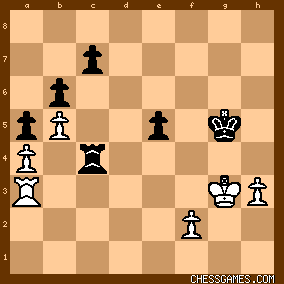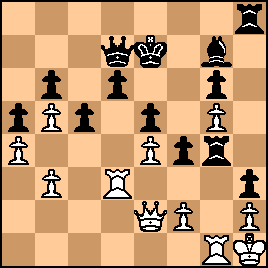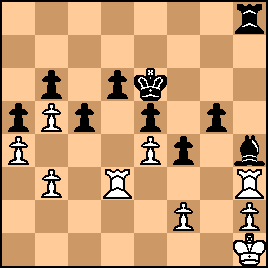| Mar-19-08 | | Knight13: 12. Bxd7 Rxd7 13. d5 gets rid of White's bad bishop for black's good one. That g2 bishop barely did anything after white played 12. d5 anyway. |
|
| Mar-19-08 | | kasp: <Knight13>'s 12. Bxd7 Rxd7 13. d5 Maybe you meant 12.Bxb7 Rxb7 |
|
| Mar-19-08 | | Knight13: <kasp> Yes. |
|
| Sep-10-13 | | zydeco: 42.Bf5! |
|
| Dec-05-13 | | Edeltalent: From a purely visual standpoint, the end reminds me a lot of another famous Botvinnik game: Botvinnik vs Fischer, 1962
click for larger view
click for larger view |
|
Jan-30-14
 | | WCC Editing Project:
"The Strange Tale of how <Vasily Smyslov> got Fifteen Extra Minutes on his Clock without Realizing it" Botvinnik:
<"...on one occasion in our match the arbiter Opocensky had to intervene; this occurred during the 18th game. Soon after the opening Smyslov's clock stopped, which was noticed by the demonstrator only some fifteen minutes later! More precisely, the clock did not stop- it continued going, and only the minute hand stopped, and so neither I nor my opponent noticed this, since the clock continued ticking...During play a second, electric chess clock was in use, enabling the spectators to observe the situation on our clocks. This electric clock was operated by the demonstrator, and it was he (with a delay of fifteen minutes) who drew the arbiter's attention to the fault in Smyslov's clock. Of course, Opecensky ordered that the faulty clock should be replaced. <<<In so doing, however, he set my opponent's clock to the same time as had been shown by the faulty clock! To my bewildered question, the arbiter replied that there was no mention in the match regulations about supervisory electric clocks, and therefore he couldn't put Smyslov's clock forward, although, essentially, it was clear how long the clock had stood still.>>> I immediately accepted the arbiter's decision, although I considered it incorrect. I decided not to approach Smyslov directly; he was so engrossed in the position that he did not notice either our discussions, which took place at the other end of the stage, or the change of clocks itself, otherwise he would undoubtedly have asked that his clock be put forward..."> -Mikhail Botvinnik, "Botvinnik's Complete Games (1942-1956) and Selected Writings (Part 2)." Ken Neat, transl., ed., (Olomouc 2012), pp.29-30 |
|
Jul-21-21
 | | plang: Botvinnik repeates the quiet system with 6 e3 that he had used with success in Game 14. In that game Smyslov had played 7..e5; here he varies with 7..a6. Botvinnik suggestion of 12 dxe..Nxe5 13 e4..a5 looks more consistent. 17..Nh7 would have avoided the pin while preparing ..f5. After 25 Bf3, 26 g4 and 27 g5 White had a positional advantage with the more active bishop. 27..Qe7 28 Kh1..Qxg5 would just activate White's forces. Botvinnik after 28..Ke7:
"It is only this quite unnecessary evacuation of the king, first to e7and then to d8, that gives White real winning chances. If Black put his rooks on h4 and h8, his bishop on e7 and his king on g7, then White would have to settle for a draw." Averbakh recommended 33 d6+..cxd 34 Bg4..Qc7 35 Rgd1..Rd8 36 Rxh3 with a dangerous initiative for White. Interesting play from both players. |
|
| Nov-14-24 | | Twilight of the Idol: <Averbakh recommended 33 d6+..cxd 34 Bg4..Qc7 35 Rgd1..Rd8 36 Rxh3 with a dangerous initiative for White.> White's definitely better after 34. ... Qc7?, which gives back the pawn without clipping the initiative. But black is okay after 34. ... Rxg4! At depth 40, stockfish evaluates the position after the exchange sacrifice as +0.8. 
click for larger view
White to move after 34. ... Rxg4
Black's forever passive, but it's also really unclear how white can break through his position. 35. Qxg4 leads to a dead position: 35. ... Qxg5 36. Rxg5 Ke6 37. Rg1 Bf8 38. Rgd1 Be7 and white can never win the h-pawn without losing g5, in which case he still can't make any progress, e.g., 39. Rf3 Bxg5 40. Rdd3 Bh4 41. Rxh3 g5 and black should draw without much difficulty. 
click for larger viewIf, instead, 35. Rxg4, white faces the same problems, just with queens on: There's no pawn breaks, winning h3 involves losing g5, and black's weak point on d6 is defended splendidly by his "bad" bishop. I don't see a way to resolve those issues. Is white still better? Sure. He's never losing this, but he's very far indeed from winning. |
|
|
|
|





